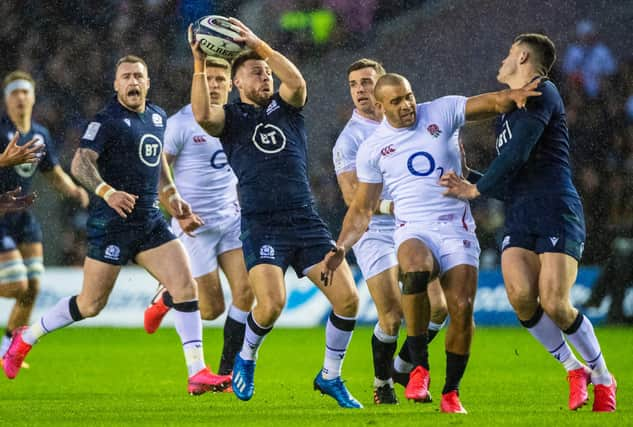Scotland v England Six Nations clash could be spoiled by weather, as for once this clash is all about flair


Conditions for the 2020 game were penitential. The forecast for today is only a little better. It’s a shame because both coaches have picked a team primed to play attacking rugby, and many have been looking forward eagerly to a classic match orchestrated by the fly-halves, Finn Russell and England’s new darling Marcus Smith. Sadly if the forecast is right, flair may be in short supply, box-kicking and high boots down the field all too plentiful.
Eddie Jones, playing his usual provocative and often silly mind-games, has been saying that Scotland are red-hot favourites, which is absurd. England’s preparation and selection may have been disrupted by injury, but there is such strength and depth of talent in the English Premiership that nobody is a red-hot favourite against them.
Advertisement
Hide AdAdvertisement
Hide AdThey had a better November than Scotland, notably beating South Africa while we lost to the Springboks. Still it’s rarely wise to base Six Nations predictions on November matches. If one were to do so, one might remark that, despite the results of these two games, the English forwards were more thoroughly subdued by the Springboks than the Scottish pack was. My impression was that at Twickenham South Africa contributed to their own defeat by some bad unforced decisions and some uncharacteristic weakness in their midfield defence which leaked two English tries.
The only surprise about Gregor Townsend’s selection is that there are no surprises. This is a very experienced Scotland team and one that has learned how to win hard and close matches. Ireland are the only team in the tournament we have failed to beat in the last four seasons. In that time our Calcutta Cup record is won two, drawn one, lost one, our best sequence against England since 1983 to 1986 when we won three and lost one.
The 1986 match was won 33-6. Usually when we have beaten England, the margin of victory has been narrow. One memory of that remarkable match is of Bill McLaren saying early in his commentary that England think they may have a Grand Slam team. Few are predicting that today, partly because they have to go to the Stade de France as well as Murrayfield. My own guess is that any Grand Slam is unlikely this year. The top five teams seem too evenly matched. Still, away wins are more common than they used to be and there have been 11 Grand Slams this century: Wales four, France three (but none since 2010), Ireland two, England two (but only one since 2003).
There are interesting selections in the England team. The centres, Henry Slade and Elliott Daly, both have a powerful left-foot kick. One may look to see them exploiting the new 50:22 Law effectively and dangerously. Then Jones has recalled Exeter’s Sam Simmonds at No 8, after a four-year absence. There is no No 8 in Europe more dangerous ball-in-hand from 10 metres out than Simmonds. His selection allows Tom Curry, captain for the day, though not yet for the series, to revert to his best position at 7. He was preferred to Hamish Watson for all three Lions Tests, which makes him quite a player. Indeed he is being compared, in England anyway, to Richie McCaw. Well, here is one clear difference. Curry gives away a good many penalties at the breakdown; McCaw, rightly or wrongly, was rarely penalised.
Goal-kicking is a worry for Scotland. Finn Russell is a magician ball-in-hand, nobody more alert to opportunities, but he doesn’t kick regularly for his club, and his success rate in internationals is at 71 per cent – low by standards today. Nor is Blair Kinghorn, reserve fly-half on the bench, any more reliable. Time was, we found it hard to score tries, but kickers like Chris Paterson, Dan Parks and Greig Laidlaw kept us in many matches and won some of them.
England, with Jones as coach, have become an unreliable side, sometimes very good, sometimes surprisingly flaky. For a long time people assessing France’s chances have said, with a shrug of the shoulders, “depends which French team turns up”. Now you might reasonably say the same about Jones’ England. They didn’t turn up against us at Twickenham a year ago. A repeat performance would not be unwelcome. But so would a dry and windless late afternoon and early evening, and the weather gods seem determined to deny us that: spoilsports.